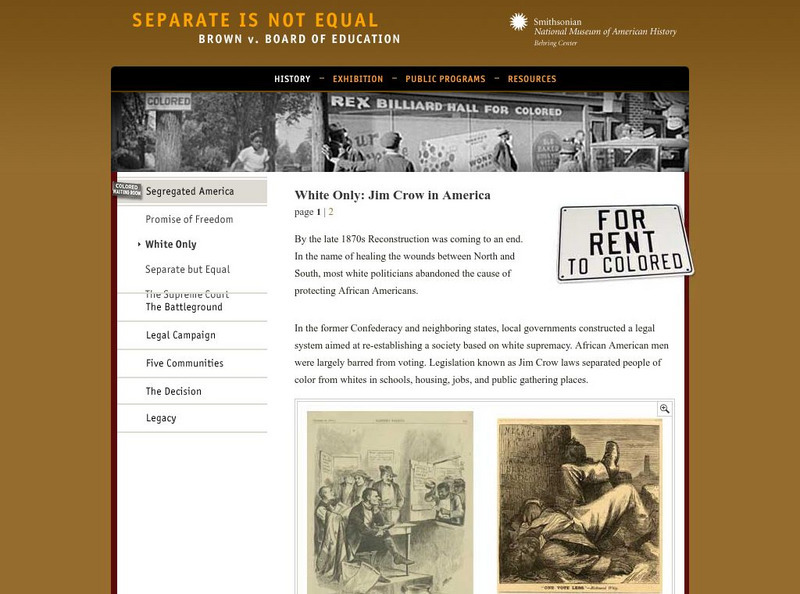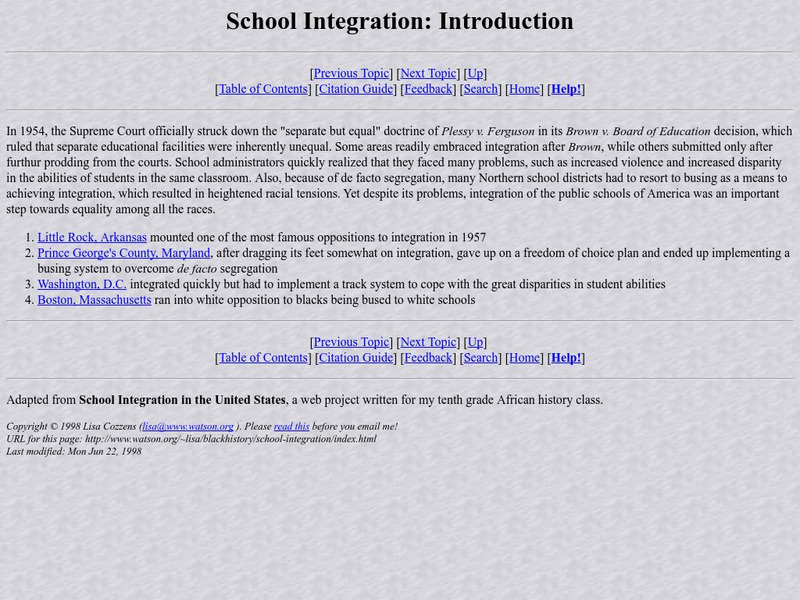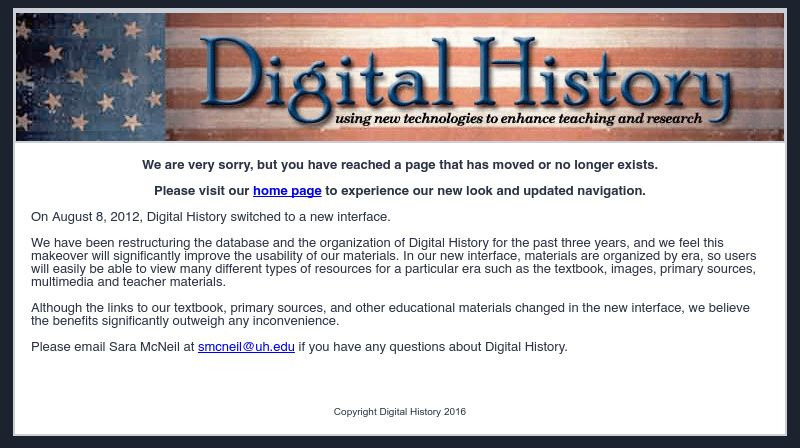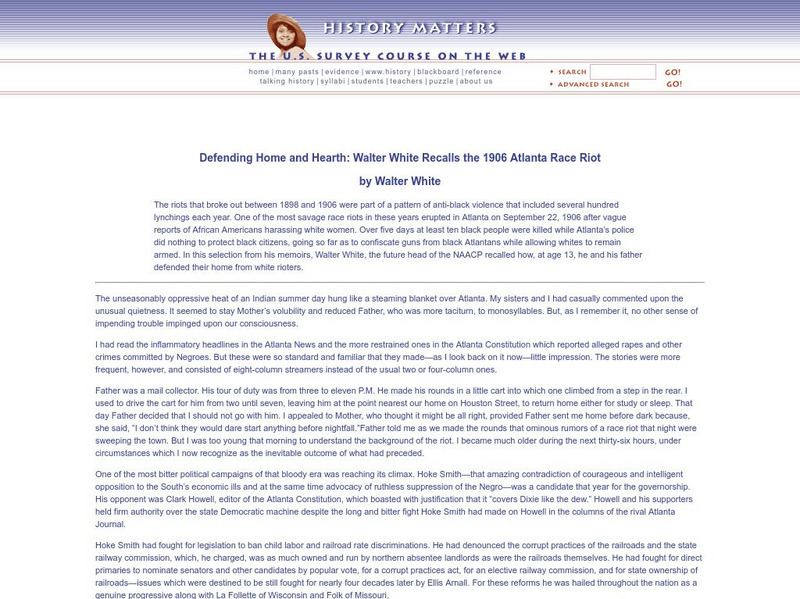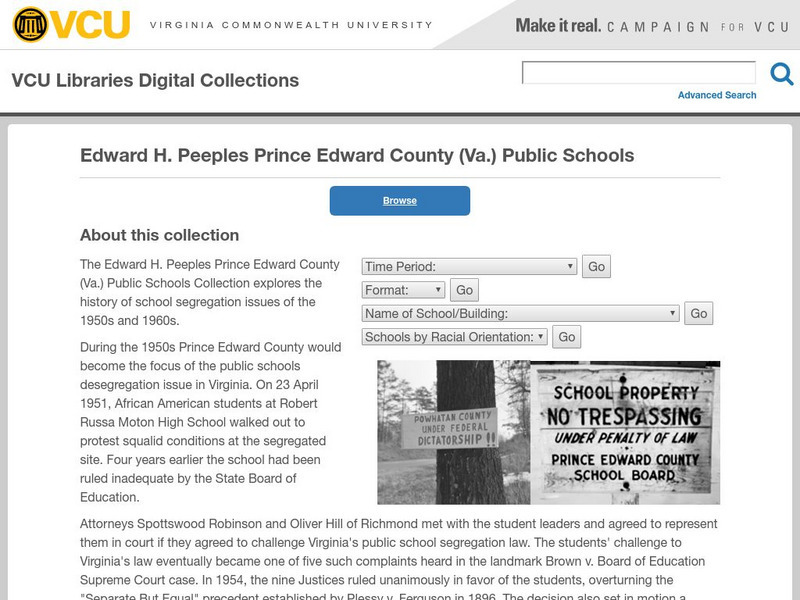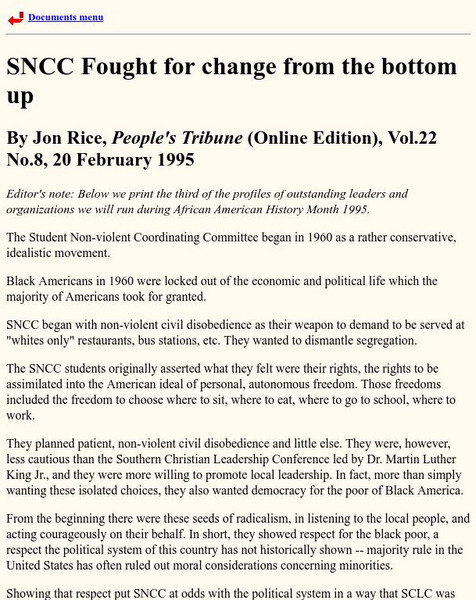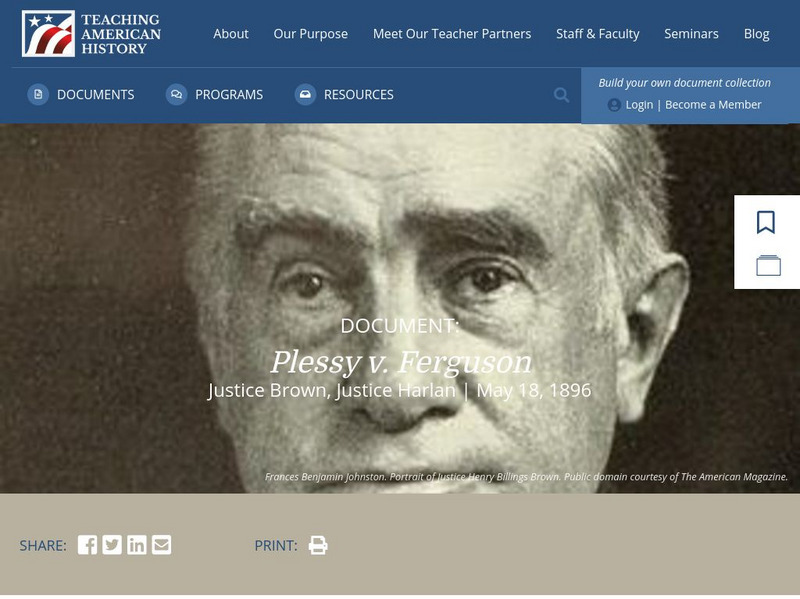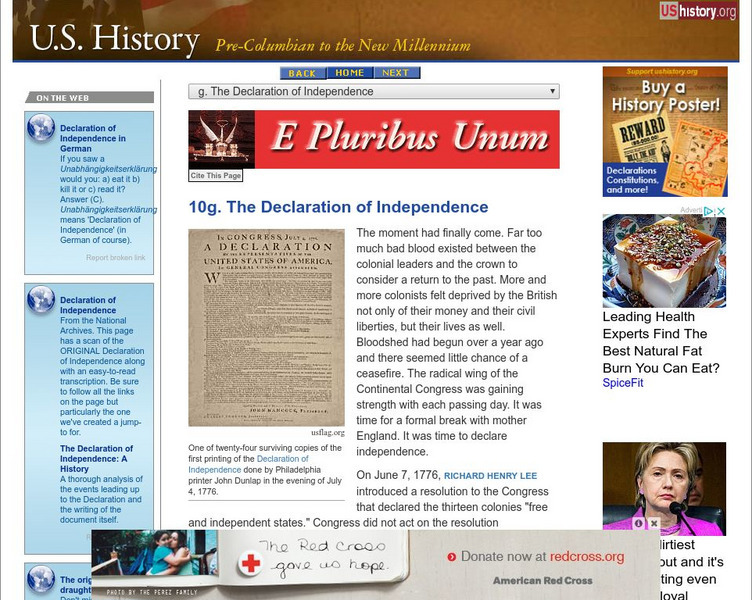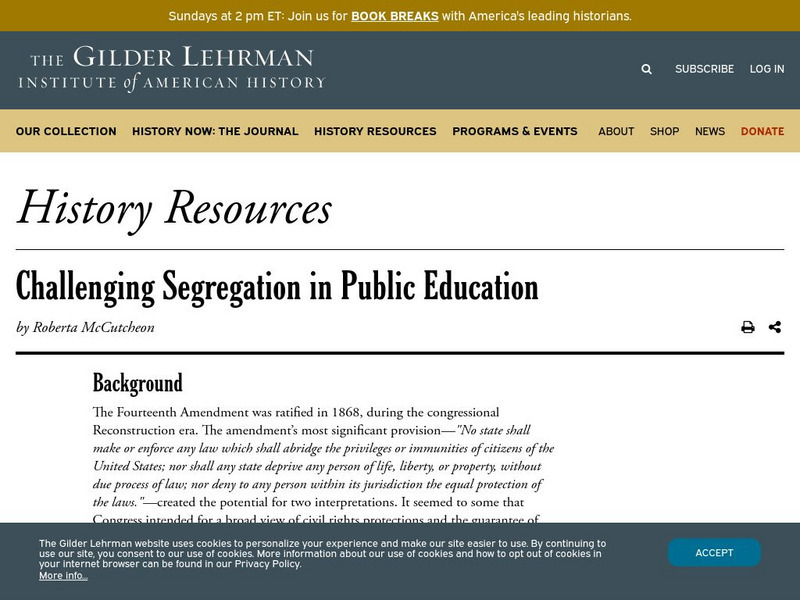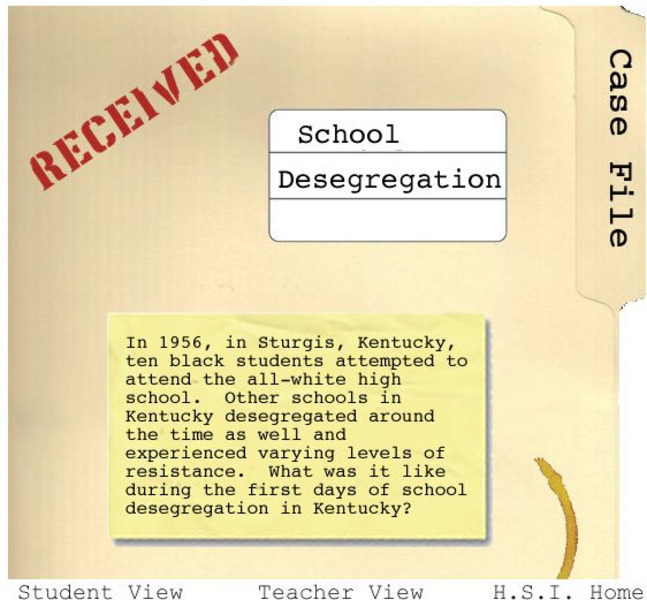Curated OER
History Matters: Separate but Equal: The Plessy v. Ferguson Case
Read the judgment of Supreme Court justice, Henry Billings Brown, who wrote for the majority in the Plessy v Ferguson decision that codified the idea of "separate but equal" in the American justice system until it was overturned by Brown...
Smithsonian Institution
National Museum of American History: Separate but Equal: The Law of the Land
A brief description of the Supreme Court decision, Plessy v Ferguson, in 1896, that solidified the separate but equal rule. Included is the title page of the Supreme Court text of the decision.
Other
In Pursuit of Freedom & Equality: Brown v. Board of Education of Topeka
Teachers and students can find a comprehensive summary of the Brown v. Board of Education of Topeka case. Learn about the myths and find out the truth. The activities offered are especially meaningful. Students can perform a...
US National Archives
Docsteach: From Dred Scott to Civil Rights Act of 1875: Eighteen Years of Change
In 1857, the U.S. Supreme Court ruled in the Dred Scott decision that African-Americans were not citizens of the United States. Yet within 18 years, Black Americans would not only have citizenship, but would be guaranteed the right to...
ClassFlow
Class Flow: Separate but Equal
[Free Registration/Login Required] Using a thorough Glossary of Terms, students discuss the idea of being separate but equal.
Digital History
Digital History: Equality Postponed [Pdf]
Read the background of the controversial Supreme Court decision in the Plessy v Ferguson case. Follow the arguments for and against "separate but equal." [pdf]
Independence Hall Association
U.s. History: Separate No Longer?
An explantion of how the Supreme Court decision in Brown v Board of Education of Topeka turned the concept of separate but equal on its head. See how they determined that the 14th Amendment was being violated when schools did not fund...
Digital History
Digital History: Plessy v. Ferguson
A very thorough explanation of the famous Supreme Court decision about Plessy v. Ferguson. It upheld the idea of "separate but equal," which was in effect until Brown v Board of Education in 1954. See who opposed the decision, and read...
Smithsonian Institution
National Museum of American History: Separate Is Not Equal: White Only
This section from the Smithsonian Institution's National Museum of American History's exhibition Separate Is Not Equal: Brown v. Board of Education gives the history of Jim Crow laws and how they affected not only the voting rights of...
Digital History
Digital History: The Supreme Court Orders Desegregation [Pdf]
This site is from a unit called 'African-Americans in the Land of Equality.' It looks at the 1954 decision by the Supreme Court in the Brown v. Board of Education case that ended school segregation.
Other
Watson.org: African American History: School Integration
A history of the attempt to integrate schools in Little Rock, Maryland, Washington, D.C., and Boston.
University of Groningen
American History: Outlines: Desegregation
Overview of efforts to overthrow Plessy v Ferguson and desegregate public schools and other places during the Civil Rights Movement.
Digital History
Digital History: Why Did the Colonists Rebel and the British Resist?
An interesting look at the make-up of Americans who supported separation from Great Britain, and some explanation of the push-back by Great Britain.
Smithsonian Institution
National Museum of American History: Separate Is Not Equal: Brown v. Board of Education
From the Smithsonian Institution's National Museum of American History, this exhibition on Brown v. Board of Education shows much of the struggle of the Civil Rights era, not only to achieve equality in educational opportunities but to...
Curated OER
History Matters: Recollection of 1906 Atlanta Race Riot
Walter White, who later became head of the NAACP, recalls witnessing the 1906 Atlanta Race Riots at age 13.
Virginia Commonwealth University
Virginia Commonwealth University: Separate but Not Equal
Telling pictures of elementary schools for Blacks and Whites during the 50s and 60s. Discusses the situation in Prince Edward County that led to the Davis v. County School Board of Prince Edward County court case.
Hartford Web Publishing
World History Archives: Sncc Fought for Change From the Bottom Up
A highly informative narrative on the development and philosophy of the Student Nonviolent Coordinating Committee, with comparisons to Dr. King's SCLC and the Black Panther Party. Good resource.
University of Groningen
American History: Documents: Plessy v. Ferguson 1896
View this document to access background information and the opinions of the Supreme Court in the Plessy v. Ferguson case (1896).
Teaching American History
Teaching American History: Plessy v. Ferguson (Excerpts)
Find excerpts of the controverisal Supreme Court decision, Plessy v Ferguson along with the dissenting opinion by Supreme Court Justice, John Marshall Harlan.
Khan Academy
Khan Academy: Ap Us History: 1865 1898: The South After the Civil War: Jim Crow
Explains how Jim Crow laws came to be created in the South and what it meant for African Americans. Discusses the Plessy v. Ferguson Supreme Court case, how its decision was eventually overturned, and the events that brought an end to...
Independence Hall Association
U.s. History: Declaration of Independence
The idea behind the Declaration of Independence and the process of writing it involved a great deal of thought and hand-wringing. Read about the three separate parts of the declaration, and the audiences for which the document was aimed.
PBS
Pbs: Brown v. Board of Education
This site discusses the history, significance, and law of the Brown v. Board of Education case.
Gilder Lehrman Institute of American History
Gilder Lehrman Institute: Challenging Segregation in Public Education
A senior high lesson plan on segregation in schools.
Other
Hsi: First Days of School Desegregation
An interactive site for students to learn about school desegregation. Photographs, oral histories and questions help guide the students to their conclusions.
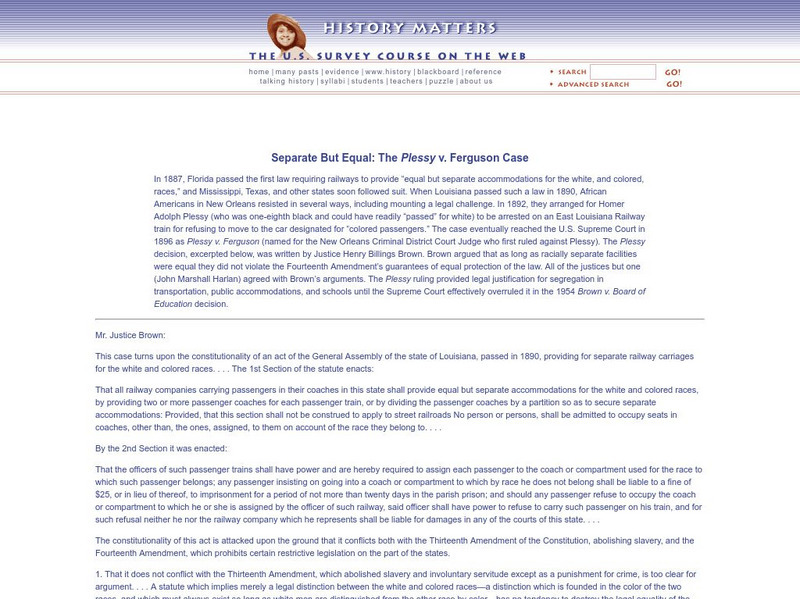




![Digital History: Equality Postponed [Pdf] Website Digital History: Equality Postponed [Pdf] Website](https://d15y2dacu3jp90.cloudfront.net/images/attachment_defaults/resource/large/FPO-knovation.png)


